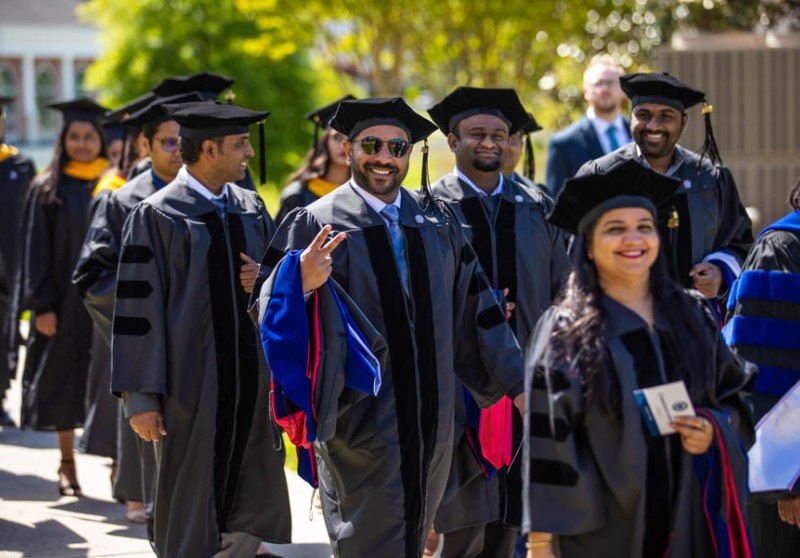As technology advances at a rapid pace, you need to stay ahead of the curve.
As an experienced IT professional, you have a wealth of knowledge and skills under your belt. But the field of IT never stands still; as it evolves, you need to evolve with it. A PhD in information technology could be what you need to ensure that you stay ahead.
More than a pathway to earning the highest credential in your field, a doctorate program offers the chance to take a deep dive into the IT industry’s challenges and opportunities. That could mean gaining deep knowledge of how machine learning solves business problems, using analytics to plan for growing IT needs, responding to evolving cyber security threats, and much more. Pursuing your executive PhD in information technology offers the license to follow your scholarly interests and make discoveries that could potentially change the industry — and the world.
By the Numbers
Programs & Requirements
Doctorate in Information Technology
The executive PhD in Information Technology hybrid degree program from University of the Cumberlands is designed to help you advance your IT career. The doctorate in information technology program comprises 60 required credit hours, including professional research courses, content specialty courses, and required residencies.
The hybrid format executive PhD in Information Technology program is a variation of our fully online program. It includes a residency component, ideal for working professionals who want a program that fits their busy schedules but isn't completely online. The hybrid format of the doctoral degree in information technology also works well for international students with visas who have a CPT/OPT component to their degree. The executive PhD in Information Technology program includes one mandatory residency weekend per semester, followed by 60 credit hours of advanced leadership and practical technical strategies in everything from information governance to emerging threats and their countermeasures.
Course Requirements
- DSRT 734 - Inferential Statistics in Decision-making
- DSRT 736 - Dissertation Seminar
- DSRT 837 - Professional Writing and Proposal Development
- DSRT 839 - Advanced Research Methods
- DSRT 850 - Qualitative Research Methods
- DSRT 930 - Dissertation
- DSRT 931 - Dissertation *
- DSRT 834 - Advanced Statistical Applications
- INTR 799/899 - Applied Learning Practicum
*Note – For executive format students, the applied learning component (internship/practicum) is established as an integral (essential) part of the established curriculum. Due to this applied learning component required for the executive format students, they must enroll in INTR 799/899 Applied Learning Practicum every term of enrollment. If the dissertation is not completed at the end of DSRT 931, the candidate repeats DSRT 931 as needed, for three (3) credit hours each term, until the dissertation is completed and successfully defended.
A content specialty area of at least eighteen hours (18) must be earned in one of several disciplines:
- Artificial Intelligence
- Blockchain
- Computer Science
- Cyber Engineering
- Data Science
- Digital Forensics
- Information Systems Security
- Information Technology
Courses in the following UC Master's programs will matriculate as the Doctoral specialty if the courses are completed beyond the first Master’s degree:
- MS Digital Forensics
- MS Information Technology
- MS Information Systems Security
- MS Cyber Engineering
- MS Blockchain
In the event a learner needs more classes, other related discipline courses could be considered with the discretion of the Department Chair and Program Director under the direction of the Dean of the School.
For a full list of course offerings or more program specific information, visit our Academic Catalog.
INTR 799/899 - Applied Learning Practicum
For executive format students, the applied learning component (internship/practicum) is established as an integral (essential) part of the established curriculum. Due to the applied learning component required for the degree program, executive format students must enroll in INTR every term of enrollment.

Executive Student Resources
UC's Department of International Graduate Services enjoys providing support resources for our international students. Find tutorials and information regarding offices and policies for the International Graduate Students and programs.
Executive Program Format
Our Executive Programs include hybrid course days designed for international graduate students studying in the U.S., or domestic students seeking a hybrid-format program. We strive to incorporate professional experience and real-world application of course curriculum into our programs to enhance the learning experience. Practical Training is an integral part of program coursework and available to all students. At the University of the Cumberlands our degree programs focus on quality education at an affordable price.
Executive Program students take three (3) courses per semester. The program semester is based on the existing UC semester calendar, with three (3) annual semesters: fall, spring, and summer. Two of the courses each semester focus on the specific program content. Additionally, students will be required to attend an intensive residency weekend as part of their course enrollment each term. The third class includes an Applied Learning Practicum, in which students apply what they are learning in their other two courses to the real world via work or internship experiences.
Residency FAQs
Residency Session dates are determined by the course that you are registered for. It is very important that you make note of the class you registered for, as well as the designated residency weekend for that course as each course will only meet one weekend for the duration of the semester.
Even though we will only be meeting one weekend per semester, we will have the same number of contact hours with you. This will enable the instructors to make residency weekends much more valuable. This change will allow us to have meaningful projects on residency weekends.
You can view your semester schedule in your self-service portal in your Student Profile. Once you log into your MyUC account, click on Academics, then click on Current Schedule. Your schedule details will indicate the date and location of your residency weekend.
You can find information on the residency site locations on our website.
Yes, all three days are mandatory, and requests to arrive late or leave early will not be approved. Should you not be in attendance for the full session, you will be counted absent for the entire session. Please plan travel accordingly!
Attendance to each executive residency class session is mandatory. Students may make up no more than one (1) residency session throughout the duration of their academic program. Missing a second residency will result in the student being dismissed from the university.
A missed session will result in the student attending a make-up session, and paying a $300 residency make-up fee. In addition, the student may be asked for documentation from the program department providing an explanation as to why the scheduled residency session was missed. Make-up sessions must be completed prior to the end of the term. Noncompliance with this policy will result in dismissal from the executive program.
Make-up residency sessions will be held at our campus in Williamsburg, KY. You will be contacted with the time and dates after your absence is reported. There will only be one (1) residency make-up session offered each semester. Failure to attend all days of the makeup session will result in receiving a failing grade for the course, as well as potential dismissal from the University, and SEVIS termination.
If you cannot be in attendance for all three days then you will be counted absent for the entire residency weekend and be required to attend the make-up residency and pay the $300 make-up fee.
The Department of International Graduate Services will contact you via your UC student email as registration for the next term approaches. Please remember that you are required to register for (one) main class, (one) online class, and Applied Learning Practicum each semester in order to maintain your F1 status – late registration will not be accepted and can result in the termination of your student status.
Once you register for a class you will want to make note of the residency weekend that your class is scheduled, as that is the only session for that class that will be scheduled for the semester. You will need to be sure to plan your travel accordingly to ensure that you are in attendance for the full residency session.
Registration is done on a first-come, first-serve basis. Once a course is full, there will not be additional seats added, as we cannot exceed classroom seating capacity; therefore, it is advised that you register for classes as much in advance as possible. As a reminder, students cannot register for future semesters until their current tuition balance is paid in full.
*Please note all times are in local time zone*
Friday
Facility will open at 4:00 p.m.
Saturday
Facility will open at 7:00 a.m.
Sunday
Facility will open at 7:00 a.m.
We ask that you please take note of the above-mentioned times and schedule your travel accordingly.
*These dates have been set; however, if any changes are made, they will be made prior to registration for that semester. Not all dates are available at each residency location.
Fall 2024 (August 26th – December 13th)
- September 27 – 29
- October 4 – 6
- October 11 – 13
- October 18 – 20
- October 25 – 27
- November 1 – 3
- November 8 – 10
- November 15 – 17
- November 22 – 24
Spring 2025 (January 6th – April 30th)
- January 31-February 2
- February 7-9
- February 14-16
- February 21-23
- February 28-March 2
- March 7-9
- March 14-16
- March 21-23
- March 28-30
- April 4-6
- April 11-13
Take the Next Step
Mission & Goals
The executive PhD in Information Technology program at Cumberlands is to teach practitioners the theories, strategies, and tactics necessary to lead in today’s global technology management field. Through this program, you will strengthen your skills in:
Information Technology Careers & Outcomes
*All statistics from the U.S. Bureau of Labor Statistics
Computer and Information Research Scientist: $136,620
Computer and Information Research Scientist: $136,620
Computer and information research scientists design innovative uses for new and existing computing technology.
Computer Network Architect: $126,900
Computer Network Architect: $126,900
Computer network architects design and build data communication networks, including local area networks (LANs), wide area networks (WANs), and Intranets.
Data Scientist: $103,500
Data Scientist: $103,500
Data scientists use analytical tools and techniques to extract meaningful insights from data.
Information Security Analyst: $112,000
Information Security Analyst: $112,000
Information security analysts plan and carry out security measures to protect an organization’s computer networks and systems.
Database Administrator/Architect: $112,120
Database Administrator/Architect: $112,120
Database administrators and architects create or organize systems to store and secure data.
Computer and Information Systems Manager: $164,070
Computer and Information Systems Manager: $164,070
Computer and information systems managers plan, coordinate, and direct computer-related activities in an organization.
Common Questions
An executive Ph.D. in information technology is a doctoral program designed for experienced IT professionals who want to apply research to real-world situations and expand the IT field’s existing body of knowledge. This program combines advanced theoretical study with practical applications in technology management and innovation.
The program typically requires around three to five years to complete, depending on the student's pace and the specific requirements of the program.
Yes, many institutions offer this degree in a hybrid format, combining online coursework with mandatory in-person residency sessions. This flexible format accommodates the needs of working professionals while providing practical training and networking opportunities.
Yes, obtaining an executive Ph.D. in information technology can be highly beneficial for career advancement. It equips you with advanced knowledge and research skills, making you a more competitive candidate for senior leadership positions and enabling you to drive innovation and strategic decision-making in the IT field.
Graduates can pursue various high-level roles such as computer and information research scientist, computer network architect, data scientist, information security analyst, database administrator/architect, and computer and information systems manager. These positions involve leading IT initiatives, designing innovative technology solutions, and managing IT operations.
To enroll, you need to meet the standard graduate admission requirements, which typically include a master's degree in a relevant field, professional experience, and sometimes industry certifications. The application process usually involves submitting transcripts, letters of recommendation, a statement of purpose, and sometimes a resume or CV.
An executive Ph.D. is a doctoral program tailored for working professionals who want to advance their careers while continuing to work. It focuses on applying research to practical challenges and includes both theoretical coursework and practical training. The format is typically hybrid, combining online and in-person components.

Executive Program Admission Requirements
All students in our executive programs are required to meet a standard set of admissions requirements for graduate students.
Faculty Experts
Learn more about the professors you will interact with in the Department of Information Technology

Dr. Vinu Russell Viswasadhas

Dr. Mark D. Mosley

Dr. Mohamed Elseifi
Request Information
Learn more about all that Cumberlands has to offer.

